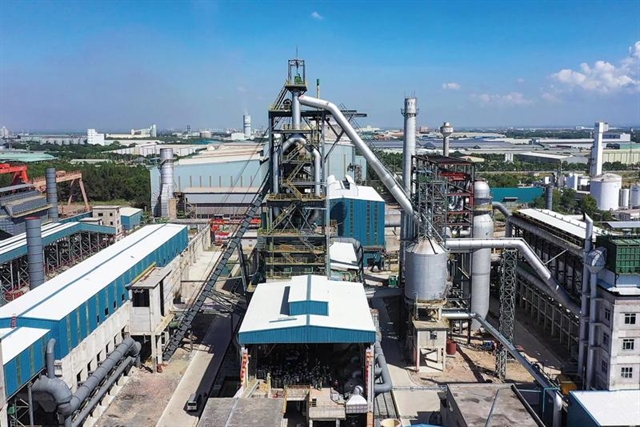Steel producers have begun to feel the pinch as weakening demand and mouting input costs have dealt a heavy blow to their steel sales. Insiders are calling for favourable policies to lift them out of hardship.

Hard-hit by weakening demand and mounting costs, steel producers are expecting higher public disbursement in the last months of the year to lift them out of hardship.
According to the Vietnam Steel Association (VSA), steel prices took a nosedive from roughly VND20 million to VND14 million per tonne between May and August. The situation was fueled by weak demand, which was in evidence in October with a sales drop of about 2 million tonnes.
Falling prices, coupled with low demand, have driven many producers into unprofitability.
Hoa Phat Group JSC (HOSE: HPG) was running at a loss of nearly VND1.8 trillion in Q3, with revenues down 12 per cent year-on-year. Hoa Sen Group (HOSE: HSG) followed suit with a loss of VND887 billion. It is worth noting that the last time HSG saw a loss was in late 2017.
Nguyen Van Sua, an expert in the steel industry, asserts that steel producers are facing a highly unfavourable condition, caused by weakening demand, mounting input costs, tightening credit, rising interest rates and volatile exchange rates.
"All those factors came at once, catching the producers off guard," said Sua.
He also mentions three other global factors that have had an impact on the domestic steel market. These factors include the Russia-Ukraine conflict, the 'zero COVID-19' policy in China and global inflation.
An HPG representative revealed that steel production in his company requires coal and ore. While ore prices fell in 2021 and remained relatively low since then, coal prices tripled to reach two highs in March and May.
The supply disruptions caused by trade sanctions and the absence of alternative trade routes for coal shipments continued to fuel the situation, heavily weighted against steel producers.
"The Russian-Ukraine conflict, a conflict between two large coal suppliers in the world, has triggered excessive concerns for coal shortages, leading to price shocks," said the representative.
Although coal prices have declined slightly recently, the situation, he believes, would not improve much because the damage is done: peak coal prices in Q2 have been factored into steel prices in Q3.
As such, volatile coal prices added nearly VND6.9 trillion to HPG costs in Q3, up 23 per cent compared to the same period last year, substantially eroding its profits.
The situation is not better on the demand side as global inflation and economic recession are weighing global demand, to the detriment of the domestic market. At home, the dull realty market amid tightening credit compounds the situation by dragging down steel sales.
"Apart from higher input costs, we have to carry the additional burden of higher inventory provisions, which contributed to our lower profit margin in Q3," added the representative.
VSA calls for governmental support to help steel producers come out of the market downturn afloat. The support includes financial assistance, price-stabilising measures, and higher delivery of public investments.
"Traffic infrastructure and large projects will give a major boost to the market," said the representative.
HPG said it is focusing on inventory management to reduce its level of finished goods inventory and improve its inventory turnover ratio, thereby easing the financial pressures from short-term debts and tied-up working capital.
Amid weakening demand from the US, EU and China, HPG said it is finding customers elsewhere, such as in Southeast Asia, to make up for the ensuing drop in sales.
Financial specialists from Vietcombank Securities forecast that steel prices would rebound in 2023 on the back of mounting demand from China, triggered by favourable policies on the Chinese realty market.
The favourable policies include the support package of RMB200 billion introduced by the People's Bank of China to restructure realty projects, the lifting of COVID-19 lockdowns and the high delivery of public investments.
Agribank Securities, meanwhile, believes that the power shortages in Europe would drive European steel producers to slash output. As a result, Vietnamese steel exports are expected to balloon next year to pick up the slack.
In the Friday session, HPG stocks rose by 5.96 per cent to reach VND15,100 apiece whereas HSG stocks hit ceiling prices, at VND8,990 apiece.
Other producers also saw green on the screen, with Pomina Steel Corporation (HOSE: POM) better off by 4.77 per cent, Nam Kim Steel JSC (HOSE: NKG) by 6.97 per cent and Dai Thien Loc Corporation (HOSE: DTL) by 6.8 per cent. — VNS





